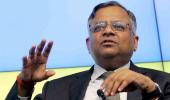A financial turnaround in Tata Steel and Tata Motors has come as a shot in the arm for Chandra.
Krishna Kant reports.
 IMAGE: Tata Sons Chairman N Chandrasekaran. Photograph: Danish Siddiqui/Reuters
IMAGE: Tata Sons Chairman N Chandrasekaran. Photograph: Danish Siddiqui/Reuters
N Chandrasekaran, who completes a year as Tata Sons chairman on February 21, is turning out to be lucky for India's largest private sector business group.
After years of losing money on two of the group's biggest bets -- global steel business and domestic passenger cars -- there are strong signs of a revival in both businesses.
Tata Steel reported a net profit for the third consecutive quarter in October-December 2017, after posting losses in seven out of nine preceding quarters.
While it still has a lot of ground to cover, with accumulated losses of nearly Rs 15,200 crore at the end of September, Chandra could not have asked for a better beginning from the company that accounts for over a quarter of the group's debt.
The Tatas have also impressed Indian car buyers with a new range of passenger cars and, as a result, Tata Motors' domestic business reported a net profit after six quarters of losses.
Commercial vehicles demand, too, picked up during the December 2017 quarter.
A financial turnaround in these two companies has been a shot in the arm for Chandra, given their central position in the group's finances.
Tata Steel is the group's most indebted firm, while Tata Motors brings in nearly 40 per cent of the group's consolidated revenue and is one with the biggest visibility among global consumers with Jaguar Land Rover.
The two accounted for nearly three-fourths of the group's listed companies' debt and fixed assets during the first half of 2017-2018 and nearly two-thirds of the group's combined revenue during the period.
"Initial signs have been positive, with Tata Motors' domestic business turning profitable and Tata Steel showing strong gains from a turnaround in the global steel cycle," says Dhananjay Sinha, head of research, Emkay Global Financial Services.
"The group's cash cow, Tata Consultancy Services, remains steady, though its pace has slackened a bit. This augurs well for the financial health of the group in the near- to mid-term," Sinha adds.
This provides Chandra an opportunity to fix the legacy issues facing the group.
For nearly a decade now, the group's consolidated finances were clouded by a continued poor show by these two companies.
For example, Tata Motors' domestic business reported losses in the last four financial years, while Tata Steel has been losing money outside India for seven consecutive years.
This increased financial burden on Tata Sons, the group holding company, which in turn disproportionately depended on cash flows (read dividends) from TCS to keep group finances steady.
Not that these behemoths are on the mend, but analysts expect Chandra to direct Tata Sons' resources to expand the group's footprint in the domestic market.
Under Ratan Tata, the group was one the largest outbound investors from India, with billions of dollars invested in setting up a global footprint in industries ranging from steel to automotive, and chemicals to hospitality goods.
This made the Tatas India's most globalised business group with overseas markets accounting for nearly 60 per cent of the group's Rs 6 trillion revenues in 2016-2017.
Market analysts and minority shareholders were, however, not impressed as most global ventures, except the JLR division, failed to be value accretive.
Worse, they saw it as a distraction that cost the group growth opportunities in the domestic market.
"In the last few years, the group has lost market share in steel, automobiles, hospitality, telecom, non-alcoholic beverages and power, among others. This has to change as the Indian economy is expected to grow faster than the rest of the world in the foreseeable future," said an analyst at a foreign brokerage on condition of anonymity.
Market experts also expect more financial conservatism after years of mergers and acquisition led growth financed through a mix of debt and cash flows from TCS.
"The group needs to fix its capital allocation strategy as most of the large group companies with the exception of TCS and Titan have failed to generate sufficient returns on the capital shareholders have entrusted with them," says G Chokkalingam, MD, Equinomics Research & Advisory.
Chandra seems to be listening and has already made his first move by divesting the loss-making mobile telephony business and shifting the focus of group companies from expansion to consolidation and asset rationalisation.
The group debt to equity ratio (on a consolidated basis) declined to 1.1x at the end of September 2017, down from 1.15x at the end of March 2017.
Most of the group companies, including Tata Steel, Indian Hotels, and Tata Chemicals, either divested loss-making assets or plan to do it in the near future.
This is freeing up resources for the group for expansion in the domestic market where it lost some ground in the last few years.
Tata Steel looks set to reclaim the pole position in the domestic steel business by expanding its greenfield unit at Kalinganagar and is a top bidder for stressed Bhushan Steel.
Tata Chemicals has expanded its food business, while Tata Motors has raised its market share in the domestic passenger car market.
The group, however, faces challenges from a slowdown in TCS' growth rates, industrial slowdown in India, and rising protectionism globally.
"A slowdown in TCS means that the group may not have the billions to splurge on mega acquisitions anymore," says Chokkalingam. "But it still has resources for a strong push in the domestic market."












 © 2025
© 2025